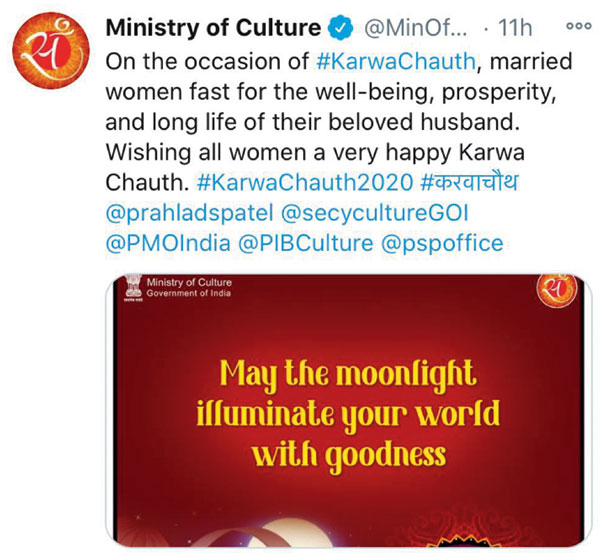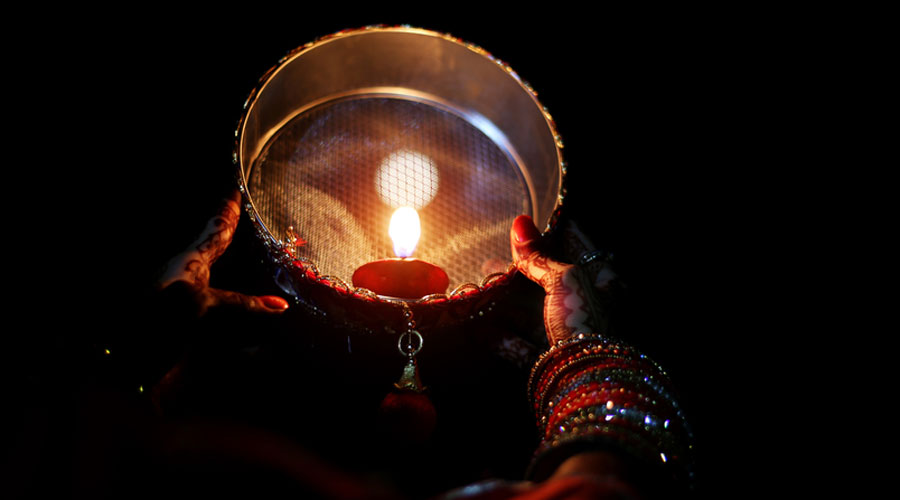The Union ministry of culture sent out a WhatsApp message on Karwa Chauth on Wednesday, an image that came with the ministry’s name on the left hand corner and this wish in the middle: “May the moonlight illuminate your world with goodness.”
At the bottom, right, were pictures of a sieve and a pot, required for the performance of the ritual, and the message, “Happy Karwa Chauth”.
The ministry also put up this image on its Twitter account, with the following message: “On the occasion of #KarwaChauth, married women fast for the well-being, prosperity and long life of their beloved husband. Wishing all women a very happy Karwa Chauth.”
The WhatsApp message was also sent to several organisations under the culture ministry.

The image tweeted by the culture ministry
Question no. 1: What exactly were institutions like libraries and museums supposed to do on Karwa Chauth?
Question no. 2: What exactly is the ministry saying and to whom?
There we can dig into a bit of ministry history. The culture ministry has been talking about Karwa Chauth for some time.
According to the ministry’s vision document 2024, India needs to compile a “National List of Intangible Cultural Heritage”.
It would have been better perhaps if such heritage was recognised by the world, but Unesco accepts only one nomination per country every year for its World Heritage list, alas. Hence the need for a list made in India.
What will be in that list? What does “Intangible Cultural Heritage” mean?
They mean unique Indian traditions such as those that celebrate relationships between man and woman, such as between husband and wife (Karwa Chauth), and brother and sister (Bhaiya Dooj, Raksha Bandhan), says the document.
On Karwa Chauth, a woman fasts for the well-being of her husband. When the moon rises, she looks at the moon through the sieve, then breaks her fast. Performed in north India (though not unknown in some Bengali homes now), it goes back to a time when men were warriors and went away for long and women would wait for them at home, praying for their safety.
The website indianculture.gov.in further explains the significance of Karwa Chauth. In the language of romance and emotion, it describes marriage and the relationship between men and women and adds: “The festival is also observed by unmarried women who pray in the hope of securing a desired life partner.”
It is also held that Karwa Chauth is celebrated to mark the end of the harvest season, the website says. “Whatever be the origins, the festival offers an occasion to strengthen familial ties.”
It goes on to link Karwa Chauth with two Hindu mythological tales.
One is that of Savitri and Satyavan in which Savitri brings her husband Satyavan back from death with her prayer and determination. “Another such story is that of Veervati, the only sister of seven loving brothers. When the brothers could not bear to see her fasting the whole day they misled her into believing that the moon had risen. Veervati broke her fast and had food but soon got the news of her husband’s death. She prayed for a whole year and the Gods, pleased with her devotion, gave back her husband’s life,” the website adds.
We can attempt a few answers here. One is a no-brainer. The ministry is giving us a definition of, what else, Indian culture. It is saying that it is Indian culture for women to starve for their men, that it is the duty of women to wait for their men, that Indian women should not give up their husbands for dead and if they don’t keep their fast properly, they may immediately drop to their death. And Indian men can just come back home and eat.
The ministry is also saying that all women should aspire to get married.
It of course does not matter to the ministry that it is, in the process, reinforcing every gender stereotype that women have been battling for so long to break. Or that it is asking Indian women to regress into the most regressive practices. Maybe there can be an argument in favour of bringing sati back too, as it perhaps shows women at their most beautiful, making the most extreme sacrifice for men.
Bollywood has done its bit for Karwa Chauth. Who can forget Raj and Simran’s stolen love on the terrace on Karwa Chauth in Dilwale Dulhaniya Le Jayenge? On Wednesday night several Bollywood leading ladies shone in their Instagram accounts in Karwa Chauth finery and they looked lovely.
Which brings us to question no. 3: What did the poor women who love food, or even their drink, do? I howled at the moon.











